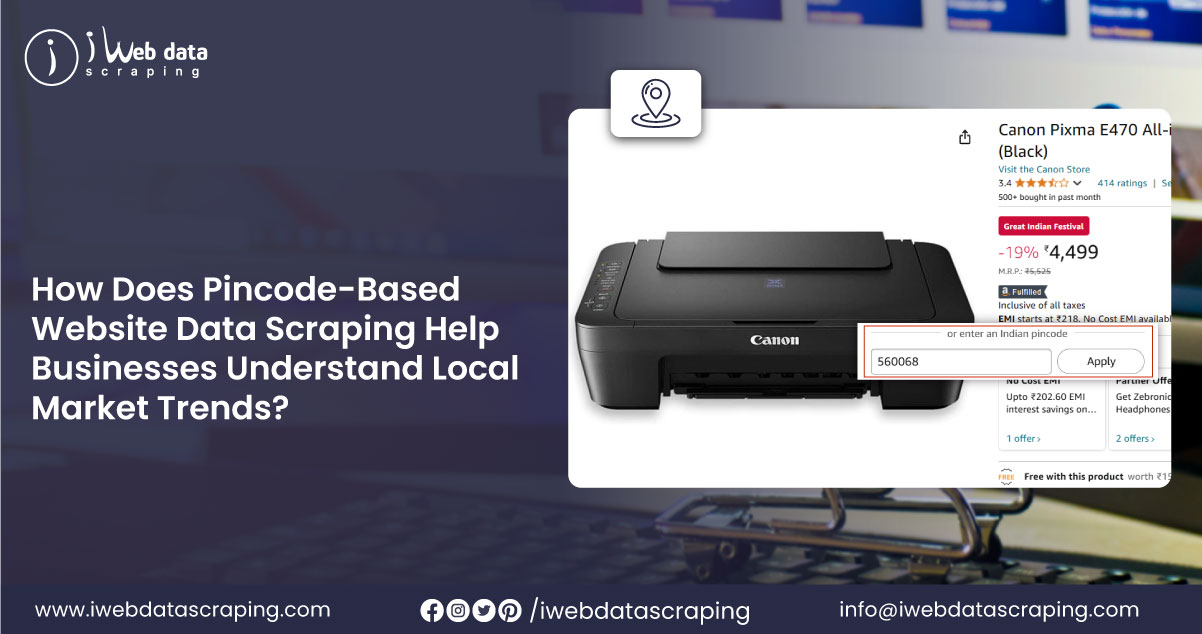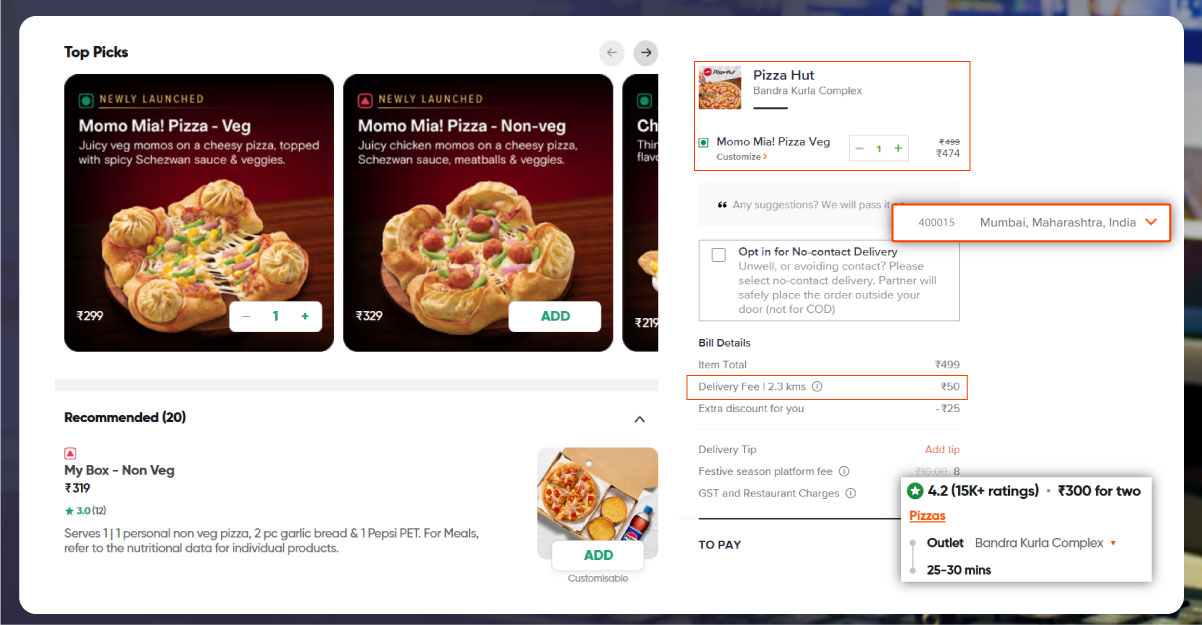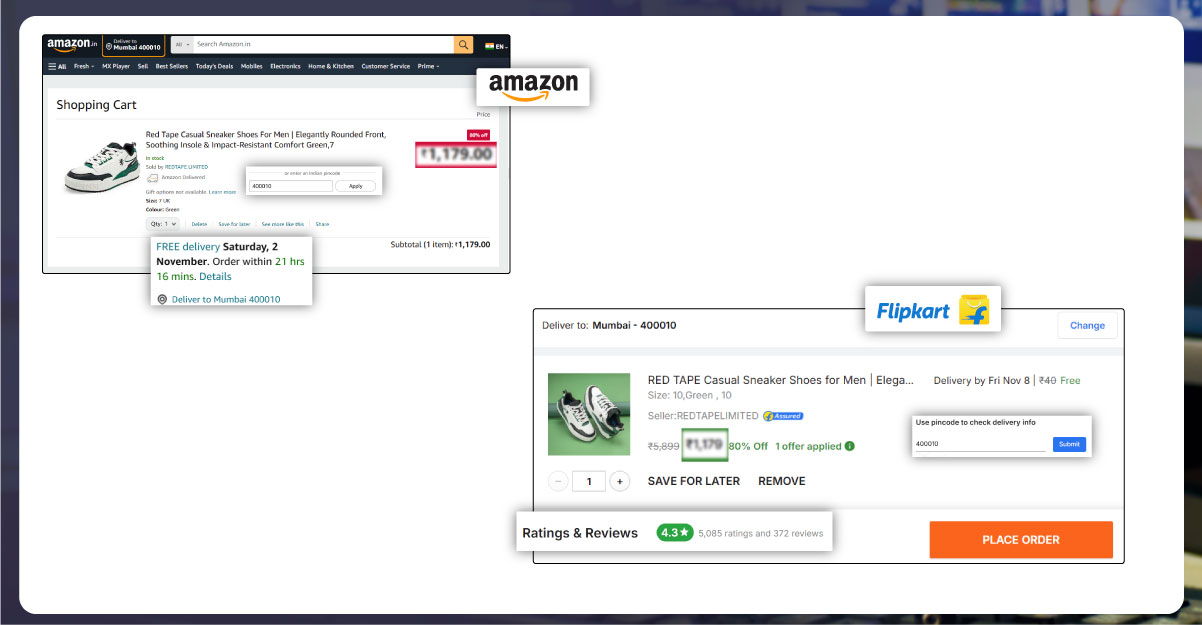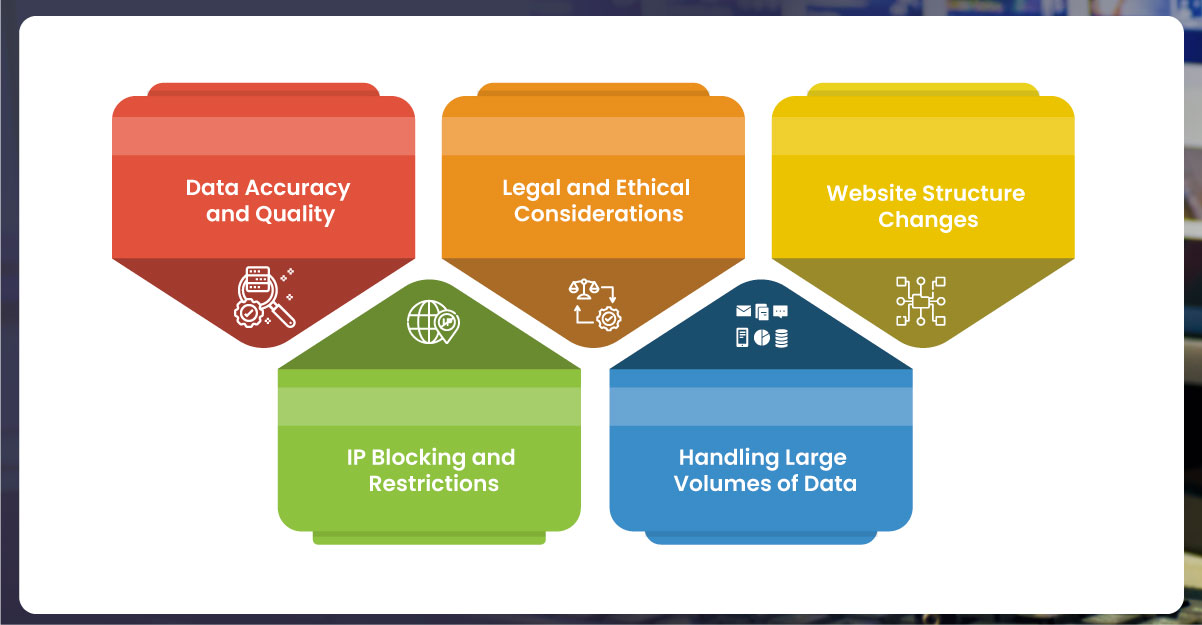

In today's data-driven world, businesses depend on accurate data for informed decision-making and enhanced customer experiences. Understanding geographic locations is essential for achieving this personalization. Pincode-based website data scraping involves extracting location-specific data from websites, allowing companies to leverage localized information effectively.
Organizations gain insights into customer demographics, market trends, and regional preferences linked to specific postal codes. This enables targeted marketing campaigns and optimized product offerings.
This article explores the significance of Pincode-based website data extraction, its applications in industries like retail and logistics, and the challenges related to data accuracy and legal compliance. Additionally, we discuss ethical considerations, highlighting responsible practices to ensure effective data use and maintain customer trust.

Pincode-based data scraping allows businesses to gather hyperlocal information, making it possible to offer targeted products and services. Businesses can optimize their operations and improve their decision-making processes by understanding customer preferences, local demand, and competitor landscapes in specific regions.
1. Enhanced Marketing Campaigns: Personalization is one of the most critical aspects of modern marketing. With Pincode-targeted data collection for websites, companies can gather local demographic information such as age groups, average income levels, and purchasing behavior. This data helps tailor marketing campaigns to resonate with specific regional audiences, leading to higher engagement and conversion rates.
2. Location-Based Pricing Strategies: Prices of goods and services often vary based on location due to local demand, competition, and socio-economic conditions. Scrape Pincode-based data for websites to help businesses monitor competitor pricing in different regions and adjust their pricing strategies accordingly. For instance, an e-commerce platform might want to lower prices in regions with intense competition or increase prices in high-demand areas where competition is minimal.
3. Optimized Supply Chain Management: Understanding local demand through Pincode data scraping API services help businesses manage their supply chains more efficiently. Retailers, for instance, can forecast the demand for certain products in specific areas and ensure timely stock replenishments in those regions. This reduces the risk of overstocking or stockouts, leading to cost savings and improved customer satisfaction.
4. Accurate Local Listings: For businesses offering localized services, such as food delivery, ride-hailing, or home services, having accurate pincode-based data is crucial. By scraping websites for pincode-specific data, these companies can ensure their platforms display accurate information, including available services, delivery areas, and pricing. This enhances the user experience and minimizes errors in service availability.
5. Targeted Customer Acquisition: Businesses looking to expand their customer base can extract restaurant location data to identify regions with untapped potential. By analyzing data from specific areas, companies can determine whether a market is underserved or has a growing demand for their products or services. This allows them to allocate resources more effectively and target regions where they can gain a competitive advantage.

Pincode-based website data scraping is crucial in helping businesses understand local market trends by extracting location-specific information from various online sources. By analyzing data linked to specific postal codes, companies can gain valuable insights into customer demographics, preferences, and purchasing behaviors unique to different regions. This targeted approach allows businesses to tailor their products, services, and marketing strategies to effectively meet local demand.
For instance, e-commerce platforms can utilize pincode-based scraping to identify popular products in specific areas and adjust their inventories accordingly. Similarly, retailers can monitor competitor pricing and promotional offers within designated pin codes, enabling them to remain competitive in their respective markets. Additionally, businesses can track emerging trends, such as seasonal variations in consumer behavior or shifts in local demand, which can inform strategic decision- making. Overall, pincode-based website data scraping equips organizations with the knowledge to enhance customer engagement and optimize their operations based on localized insights.

The applications of pincode-based data scraping span various industries, from e-commerce and real estate to healthcare and transportation. Let's explore some key sectors where this technique has a significant impact.
1. E-commerce Platforms: E-commerce businesses thrive on offering personalized shopping experiences. Extracting e-commerce store location data from competitor websites or marketplaces allows these platforms to offer region-based product suggestions, shipping rates, delivery times, and promotional offers. Additionally, they can gather data on product availability, prices, and discounts in different areas, enabling them to stay competitive in local markets.
2. Healthcare Sector: In the healthcare industry, location-specific data is vital in ensuring the availability of services and resources in underserved areas. By scraping websites for data on hospitals, clinics, pharmacies, and healthcare providers in different pin codes, healthcare organizations can identify gaps in service provision and plan the allocation of resources accordingly. Additionally, grocery store location data collection helps monitor the pricing of healthcare services in different regions and adjust their offerings to remain competitive.
3. Food Delivery Services: Companies in the food delivery sector rely heavily on location-based data to offer customers accurate delivery options and times. By scraping pincode-specific data from competitor platforms, these services can determine delivery zones, analyze competitor pricing, and track popular restaurants in specific regions. This data helps them optimize their delivery network and meet customer expectations.
4. Retail and Consumer Goods: Retailers often adjust their offerings based on regional preferences, product demand, and local competition. Pincode-based data scraping helps retailers gather information on competitor product offerings, discounts, and stock availability in specific regions. This enables them to make informed decisions about product assortment, promotions, and inventory management.
5. Transportation and Logistics: In the transportation and logistics sectors, pincode-based data scraping can be used to monitor local traffic patterns, delivery routes, and shipping rates. Companies can gather data on competitor delivery times, costs, and coverage areas, allowing them to optimize their operations and offer more efficient services to customers in specific regions. Using a Pincode-Targeted data scraping tool can further enhance data collection capabilities.

While pincode-based data scraping offers numerous benefits, it has its fair share of challenges. Understanding these challenges is essential for businesses to implement scraping strategies while effectively complying with regulations.
1. Data Accuracy and Quality: One of the primary challenges in pincode-based data scraping is ensuring the accuracy and quality of the data collected. Websites often display data dynamically based on user input, such as entering a PIN or selecting a location. If not handled correctly, scraping such dynamic data can result in incomplete or inaccurate information. Businesses need to use advanced scraping techniques to ensure they are capturing the correct data for each specific PIN.
2. Legal and Ethical Considerations: Web scraping, in general, falls into a legal gray area, and pincode-based scraping is no exception. Many websites have terms of service that restrict scraping, and violating these terms can lead to legal penalties. Additionally, scraping data without proper permissions can raise ethical concerns, especially concerning sensitive or personal information. Businesses must adhere to legal guidelines and ethical standards when using pincode-based data scraping.
3. Website Structure Changes: Websites frequently change their layouts, structures, or content delivery mechanisms, which can disrupt scraping processes. For pincode-based scraping, this challenge becomes more pronounced as even a minor change in how pincode- specific data is presented can affect the entire scraping process. Businesses need to continuously monitor the websites they are scraping and update their scraping tools to adapt to these changes.
4. IP Blocking and Restrictions: Many websites implement security measures, such as IP blocking or rate limiting, to prevent scraping activities. When engaging in pincode-based scraping, businesses must employ strategies such as rotating IP addresses, using proxies, and limiting the frequency of requests to avoid detection and prevent being blocked by the target website./p>
5. Handling Large Volumes of Data: Pincode-based data scraping can result in the collection of vast amounts of data, especially for businesses operating on a national or global scale. Managing, storing, and analyzing this data efficiently can be challenging. Businesses must invest in robust data management and analytics systems to extract valuable insights from the scraped data.

The ethical and legal landscape surrounding pincode-based data scraping is complex and evolving. As mentioned earlier, many websites clearly restrict scraping in their terms of service and violating these terms can lead to legal repercussions. Additionally, scraping personal or sensitive data, even if it is publicly accessible, can raise privacy concerns.
1. Adhering to Website Terms of Service: Businesses must carefully review the terms of service of the websites they intend to scrape. If a website explicitly prohibits scraping, businesses should seek permission or refrain from scraping that site to avoid legal consequences.
2. Complying with Data Privacy Regulations: With the rise of data privacy regulations, such as the General Data Protection Regulation (GDPR) in the European Union, businesses need to be extra cautious about the type of data they scrape. Scraping personal data without proper consent can lead to severe penalties under these regulations.
3. Ethical Data Usage: Even if the data collected is publicly available, businesses must consider the ethical implications of their actions. They should avoid using scraped data in ways that could harm individuals or communities, such as using location-based data to discriminate or manipulate customers.
Pincode-based website data scraping is a powerful tool for businesses looking to gain hyperlocal insights and optimize their operations. By collecting location-specific data, companies can enhance their marketing campaigns, adjust pricing strategies, improve supply chain management, and offer personalized services. However, the process has challenges, including data accuracy, legal considerations, and ethical dilemmas.
Businesses that engage in quick commerce store location data collection must use advanced scraping techniques, adhere to legal guidelines, and act ethically. With the right approach, pincode- based data scraping can provide valuable insights that help businesses stay competitive in an increasingly localized market.
Experience top-notch web scraping service and mobile app scraping solutions with iWeb Data Scraping. Our skilled team excels in extracting various data sets, including retail store locations and beyond. Connect with us today to learn how our customized services can address your unique project needs, delivering the highest efficiency and dependability for all your data requirements.